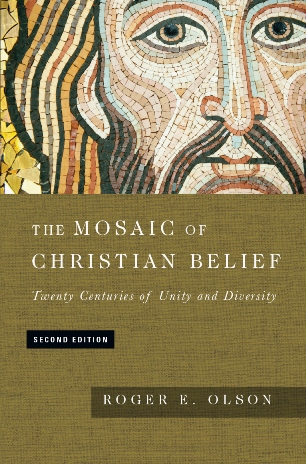Roger Olson: The Mosaic of Christian Belief
 Roger E. Olson, The Mosaic of Christian Belief: Twenty Centuries of Unity and Diversity, Second Edition (Downers Grove, IL: IVP Academic, 2016), 396 pages.
Roger E. Olson, The Mosaic of Christian Belief: Twenty Centuries of Unity and Diversity, Second Edition (Downers Grove, IL: IVP Academic, 2016), 396 pages.
Roger Olson was raised Pentecostal and now writes as an evangelical within the Baptist tradition. Although Baptist, he is neither a fundamentalist nor a Calvinist. Rather, he is one of the few Arminian evangelical theologians who have written an accessible text introducing theology.
Olson’s intention is for the book to serve as a “very basic, relatively comprehensive, nontechnical, nonspeculative one-volume introduction to Christian belief” (p. 7). Hence, Olson primarily aims to describe the various views that Christians have held in Christian history rather than arguing for any particular viewpoint. Aside from the first chapter, the book’s outline follows the key topics in systematic theology, like, creation, Jesus, and the Church. Each chapter includes a section explaining what the historical consensus of the church has been regarding the theme of the chapter, a section explaining alternative views (including both historical heresies and, in some cases, non-Christian views), and a section outlining diverse Christian beliefs regarding the chapter’s topic. This approach not only helps readers avoid heretical beliefs, but it also serves Olson’s irenic aim of helping readers realize that there is a core to Christian beliefs that also allows for authentic Christians to disagree on some points. Olson concludes each chapter by also proposing a brief “unitive Christian vision” of the doctrine under discussion, where he briefly recommends his own position, including an affirmation of the consensus as well as an attempt to take a “both-and,” rather than “either-or,” approach to the various theological issues regarding which Christian disagree.
Cessationism is largely a phenomenon of Modern Protestant Christianity.
The greatest strength of this book is its historical content.
Reviewed by Andrew K. Gabriel
Publisher’s page: http://www.ivpress.com/cgi-ivpress/book.pl/code=5125
Preview: https://books.google.com/books/about/The_Mosaic_of_Christian_Belief.html?id=WPakCgAAQBAJ
Category: Church History, Fall 2016


